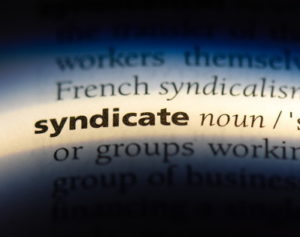 The idea of joining others to form a betting syndicate and combining forces to take on the bookmakers is something of a grey area. They have existed for almost as long as the very act of betting, but not all bookies approve of them. If they’re not officially formed then they run the risk of falling foul of a bookmaker’s terms and conditions, given that betting on someone else’s behalf breaks those Ts & Cs.
The idea of joining others to form a betting syndicate and combining forces to take on the bookmakers is something of a grey area. They have existed for almost as long as the very act of betting, but not all bookies approve of them. If they’re not officially formed then they run the risk of falling foul of a bookmaker’s terms and conditions, given that betting on someone else’s behalf breaks those Ts & Cs.
On the whole, bookies tend to turn a blind eye to betting syndicates as they know it happens but proving it can be much more difficult. The legality of betting syndicates can depend on things such as whether the person placing the bets is making a profit, whilst the likes of the size of the stakes being played also makes a difference. When betting syndicates go wrong it can be difficult for all concerned.
Betting Syndicates Explained
 Doubtless we’ve all heard about syndicates on the National Lottery, with the likes of work colleagues and friends clubbing together to buy tickets for the lottery each week with the understanding that they’ll split any winnings equally. In essence, it’s a form of pool betting in which two or more people will club together to combine their stakes in order to have a greater chance of winning a prize.
Doubtless we’ve all heard about syndicates on the National Lottery, with the likes of work colleagues and friends clubbing together to buy tickets for the lottery each week with the understanding that they’ll split any winnings equally. In essence, it’s a form of pool betting in which two or more people will club together to combine their stakes in order to have a greater chance of winning a prize.
Whilst the lottery syndicate is the most common form of clubbing together, it can be done by people betting on everything from horse racing to tennis. It works in the same way regardless of what is being bet on, with everyone combining their stakes and then one person putting the bet on. Sports syndicates will often rotate who it is that is laying the bet, with winnings being pooled and shared out.
Sometimes groups will simply use winnings to place future bets, but the idea is for everyone to agree on what to do with any money won. It’s not uncommon for groups to decide that they’ll collect the money together and use it to pay for something such as a trip to the Cheltenham Festival or Royal Ascot in the hospitality area of the racecourse, say. The key thing is that everyone agrees with how the syndicate will operate.
Are Betting Syndicates Legal?
 Whereas syndicates are actively encouraged by the National Lottery, sportsbooks are far less likely to welcome syndicates to their sites. Indeed, the terms and conditions of most sports betting sites clearly state that placing a bet on someone else’s behalf goes against the rules of having an account. Theoretically, if a sportsbook operator discovers that you’re betting in a syndicate then they can close your account down permanently.
Whereas syndicates are actively encouraged by the National Lottery, sportsbooks are far less likely to welcome syndicates to their sites. Indeed, the terms and conditions of most sports betting sites clearly state that placing a bet on someone else’s behalf goes against the rules of having an account. Theoretically, if a sportsbook operator discovers that you’re betting in a syndicate then they can close your account down permanently.
When it comes to the legal side of things, you’re not allowed to place bets for other people. This is largely because bookmakers are required by the United Kingdom Gambling Commission to know exactly who they are taking money from and precisely where that money came from. This is in order to avoid accusations of money laundering, which has become a blight on the gambling industry in general.
Where things become slightly more grey in nature is when it comes down to whether or not the person actually placing the bets is making a profit from doing so. If they’re collecting the stakes and then placing the bet without making a personal profit then it’s ok, whereas if they make a profit from collecting the bets then it becomes an illegal activity. Little wonder, then, that it’s very difficult for bookies to understand whether it’s ok or not.
The other thing that will grab a bookmaker’s attention is the size of the bets being placed. A ten person syndicate with everyone contributing £5 towards the bets each week will garner far less attention than one with the same number of people putting £200 into the pot on a weekly basis. Sportsbooks are averse to paying out large sums of money, so if they suspect the latter is going on they’ll look to shut it down straight away.
Example Situations
 There have been a number of examples of syndicate betting making the news over the years. There are numerous reasons for this, but the main one is that syndicate betting feels like something that anyone could get caught up in, so it’s a story that grabs that media’s attention.
There have been a number of examples of syndicate betting making the news over the years. There are numerous reasons for this, but the main one is that syndicate betting feels like something that anyone could get caught up in, so it’s a story that grabs that media’s attention.
Here’s a look at some examples of syndicate betting being discovered by betting companies and what happened:
DVLA Lottery Winners
A group of 16 workers at the Driver and Vehicle Licensing Agency, based in Swansea, entered a lottery syndicate with each other. The syndicate won £1 million in the EuroMillions, but not long after registering their success they began arguments amongst themselves. The argument was over three members who, it was suggested, had not paid their money for that week’s lottery draw.
The 16 members would have taken home £62,500 each, but if the three that were accused of not keeping up to date with their dues were excluded from the split then that would go up to £76,932; an increase of £14,423 per person. One of the workers soon explained a ‘bad atmosphere’ that was present in the office, pointing out that things can quickly ‘turn nasty’ when there’s money involved in discussions.
The National Lottery recommends a ‘syndicate contract’ being drawn up before syndicates are entered into, with paperwork helping to explain the rules to everyone involved. The company even provides templates for such a contract in order to help with such situations as this one. Obviously the DVLA syndicate didn’t use one, eventually taking a vote on whether the three workers should be paid their share of the winnings.
Tony Bloom & StarLizard
When it comes to stories about betting syndicates, not all of them are bad ones. The evidence for that can be found in the fact that Tony Bloom owns Brighton & Hove Albion Football Club, the Premier League side. He is also the founder of StarLizard, a betting syndicate advisory group that represents some of the most lucrative betting opportunities in British betting, making about £100 million a year.
The company uses complex models involving data analysis to come up with its betting decisions, often providing more accurate odds than the bookmakers are able to find. In addition to traditional aspects, they also look at the likes of the weather and a given team’s morale. Bloom’s winning record is impressive and helped him to become extremely rich, to the point that he now owns a top-flight football team.
